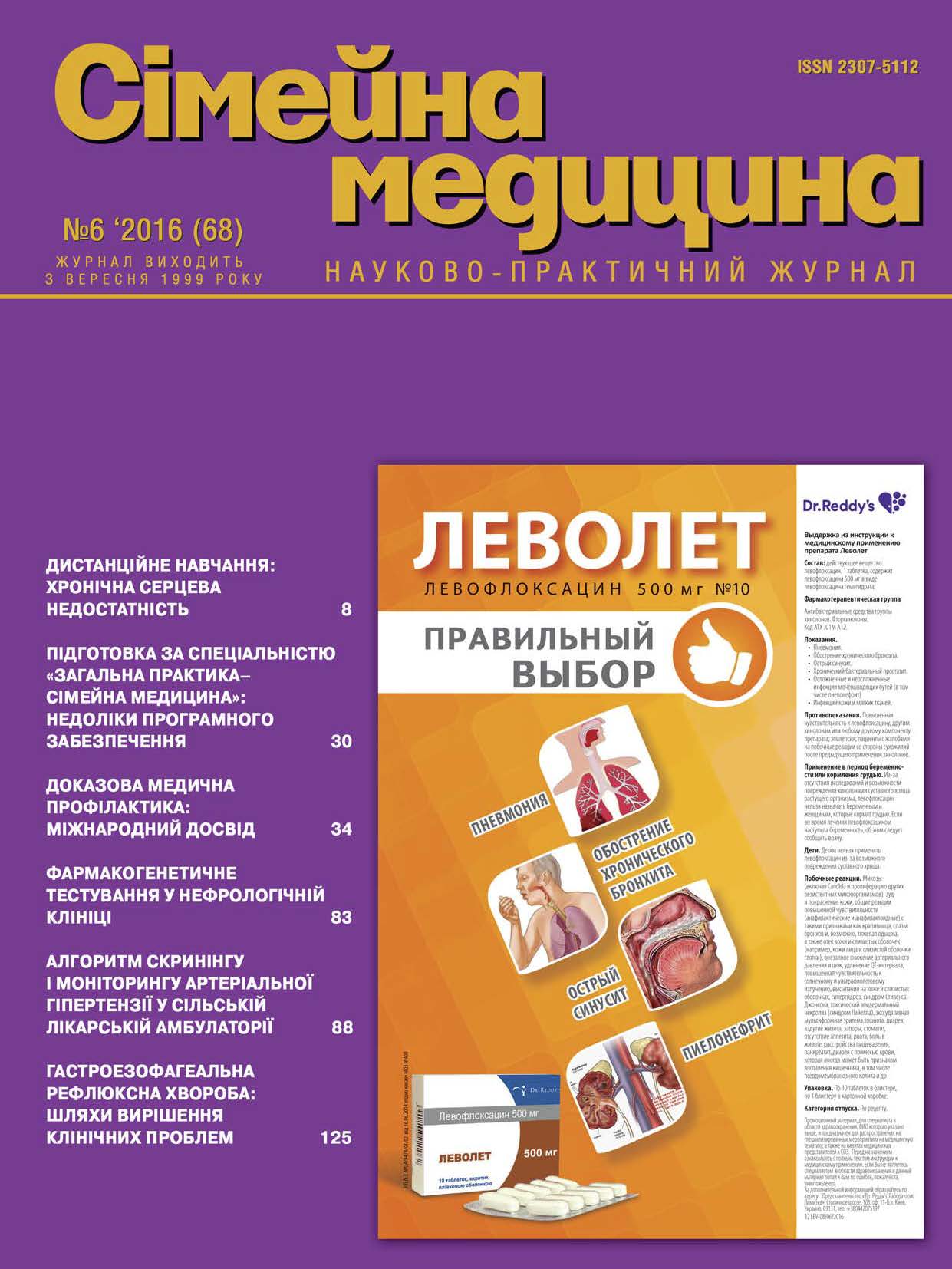Evidence Based Medical Prevention: International Experience
##plugins.themes.bootstrap3.article.main##
Abstract
The objective: was to study the international experience of evidence based preventive medicine development as well as to estimate its perspectives in Ukraine.
Patients and methods. Main principles and methods of scientific knowledge and research have been used including universal ones, methods of systemic approach, quantitative and qualitative information analysis, classification and systematization of theoretical and empirical data, hystorical and logical methods, health statistics as well). In total 529 scientific information sources have been studied, particularly a number of evidence based medicine (EBM) computer databases, special task forces recommendations and Cochrane reviews on prevention, Register of medical and technological documents for health care standards in Ukraine et al.
Results. The contribution of foreign scientific schools in the development of EBM has been determined, as well as the crucial role of scientific works carried out in the US and Great Britain in 1930–80s as to the development of evidence based preventive medicine. The international experience of the development and functioning of evidence based practice centers’ and special task forces on prevention has been summarized, as the experience of the development and implementation of recommendations on prevention in primary health care (PHC) in high income countries acceptable for Ukraine. The concept of evidence based prevention has been first proposed. It is revealed, that EBM implementation in Europe has been prioritized in both the field of infectious diseases prevention and PHC, while there are both the development of differentiated evidence based prevention and early evidence based diagnosis in PHC in the US.
Conclusion. The results proved importance of taking into consideration of international experience while evidence based PHC is being developed as a priority in Ukraine.
##plugins.themes.bootstrap3.article.details##

This work is licensed under a Creative Commons Attribution 4.0 International License.
Authors retain the copyright and grant the journal the first publication of original scientific articles under the Creative Commons Attribution 4.0 International License, which allows others to distribute work with acknowledgment of authorship and first publication in this journal.
References
Половина стран не готовы к предупреждению и лечению различных видов рака. 1 февраля 2013 г., Женева–Лион // Східноєвроп. журнал громадського здоров’я. – 2013. – № 1 (21). – С. 20-21.
Пузанова О.Г. Доказове обґрунтування скринінгів у первинній ланці охорони здоров’я / О.Г. Пузанова / Мистецтво лікування. – 2015. – № 7–8 (123–124). – С. 43-52.
Пузанова О.Г. Обґрунтування та інформаційне забезпечення концепції доказової профілактики в охороні здоров’я: Автореф. дис. … д-ра мед. наук: спец. 14.02.03 «соціальна медицина» /О.Г. Пузанова. – К., 2015. – 40 с.
Ревенок К.М. Доказовий підхід у клініці внутрішніх хвороб: розвиток і перспективи / К.М. Ревенок, В.А. Горголь, О.Г. Пузанова. – Практикуючий лікар. – 2016. – № 3. – С. 73-80.
CTFPHC: [сайт]. – [Електронний ресурс]. URL: http://www.canadiantaskforce.ca (дата звернення: 23.06.2016).
Evidence-based methodologies for public health – How to assess the best available evidence when time is limited and there is lack of sound evidence. ECDC Technical Report / [ECDC] / [ed. J. Giesecke]. – Stockholm: ECDC, 2011. – 58 p.
Generalizability of systematic reviews of the effectiveness of health care interventions to primary health care: concepts, methods and future research / [M. Nasser, C. van Weel, J.J. van Binsbergen et al.] / Family Practice. – 2012. – Vol. 29 (Suppl. 1): i94-i103.
Global action plan for the prevention and control of noncommunicble diseases 2013–2020. – WHO, Geneva, 2013. – 103 p.
Implementing evidence-based practice. a review of the empirical research literature / [M. Gray, E. Joy, D. Plath et al.] // Res. Soc. Work Practice. – 2013. – Vol. 23, № 2. – P. 157-166.
Larson E.L. Publication guidelines need widespread adoption / E.L. Larson, M. Cortazal // J. Clin. Epid. – 2012. – Vol. 66, Iss. 3. – P. 239-246.
Medizinische Leitlinien in Deutschland 1994-2004. Von der Leitlinienmethodik zur Leitlinienimplementierung / [G. Ollenschlдger, C. Thomeczek, F. Thalau et al.] // Z. Arztl. Fortbild. Qualitatssich. – 2005. – B. 99 (1). – S. 7-13.
Nakayama T. Confusion about the concept of clinical practice guidelines in Japan: on the way to a social consensus / T. Nakayama, B. Budgell, K. Tsutani // Int. J. Quality in Health Care. – 2003. – Vol. 15. – Р. 359-360.
Nardini C. Mechanistic understanding in clinical practice: complementing evidence-based medicine with personalized medicine / C. Nardini, M. Annoni, G. Schiavone // J. Eval. Clin. Pract. – 2012. – Vol. 18 (5). – P. 1000-1005.
Nationale Versorgungsleitlinien (NVL): [сайт]. [Електронний ресурс]. URL: http://www.leitlinien.de (дата звернення: 25.07.2010).
Schwarzer R. Methods, procedures, and contextual characteristics of health technology assessment and health policy decision making: comparison of health technology assessment agencies in Germany, UK, France and Sweden / R. Schwarzer, U. Siebert // Int. J. Techn. Assess. Health Care. – 2009. – Vol. 25 (3). – P. 305-314.
The Cochrane Collaboration: [сайт]. – [Електронний ресурс]. – URL: http://www.cochrane.org (дата звернення: 23.06.2015).
The periodic health examination / [Canadian Task Force on the Periodic Health Examination] // Can. Med. Assoc. J. – 1979. – Vol. 121. – P. 1194-1254.
The world health report 2008: primary health care now more than ever / [eds. T. Evans, W.V. Lerberghe]. – Geneva: WHO, 2008. – 125 p.
URL: http://www.who.int/nmh/publications/essentia_ncd_interventions_ir_settings_pdf?ua=1 (дата звернення: 01.11.2016)
USPSTF: [сайт]. [Електронний ресурс]. URL: http://www.uspreventiveservicestaskforce.org (дата звернення: 23.06.2015).





